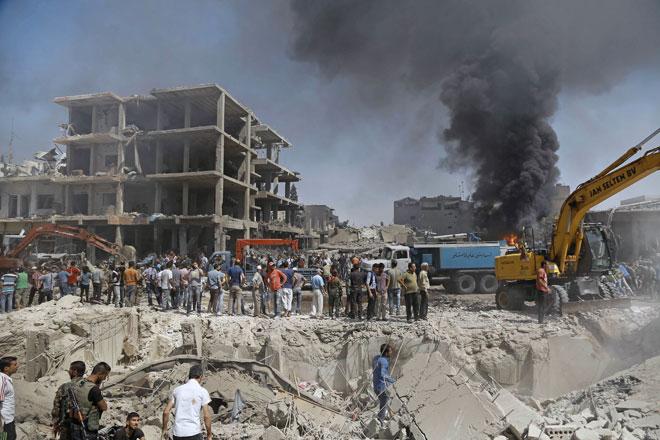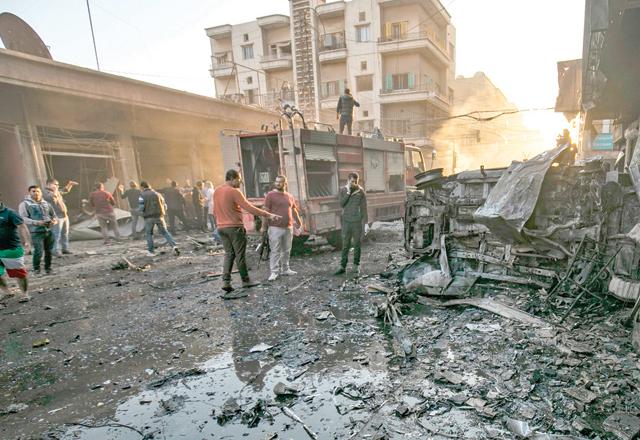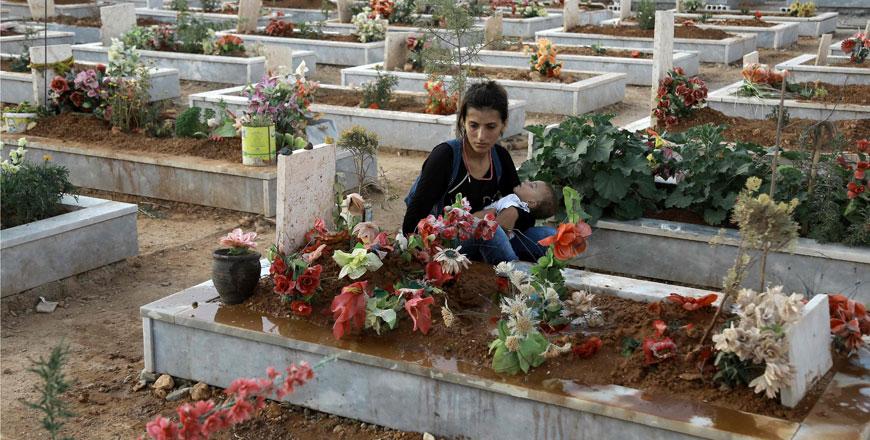You are here
Massive Daesh bomb attack kills 44 in Syrian Kurdish city
By AFP - Jul 28,2016 - Last updated at Jul 28,2016

Residents gather at the site of a bomb attack in Syria’s northeastern city of Qamishli on Wednesday (AFP photo)
QAMISHLI, Syria — A massive bomb blast claimed by the Daesh terror group killed at least 44 people and wounded dozens on Wednesday in the Kurdish-majority Syrian city of Qamishli.
It was the largest and deadliest attack to hit the city since the beginning of Syria's conflict in March 2011.
Syrian state media gave a toll of 44 dead and 140 injured in the bombing, which hit a western district of the city where several local Kurdish ministries are located.
The Britain-based Syrian Observatory for Human Rights monitor gave a toll of 48 dead, adding that children and women were among those killed.
Kurdish officials said the attack was carried out by a suicide bomber driving an explosives-laden truck, adding that the blast detonated a nearby fuel container.
An AFP journalist saw devastating scenes in the bomb's aftermath, with distraught civilians, some covered in blood, staggering through rubble past twisted metal and the burned-out remains of cars.
One man running along the streets was completely covered in blood, his shirt drenched red.
He was gripping the arm of a small boy whose face was grey and red with blood and dust.
They ran past a hysterical woman who was crying and screaming, her clothes torn. A girl and boy stood next to her, apparently in shock.
Children could be heard screaming as smoke rose from small fires that continued to burn amongst the rubble.
Civilians and local security forces with guns slung across their backs worked to carry the dead and wounded from the remains of damaged and destroyed buildings.
US probes civilian casualties
Daesh claimed the attack in a statement circulated on social media, calling it “a response to the crimes committed by the crusader coalition aircraft” in the town of Manbij, a bastion of the extremist group in Syria’s Aleppo province.
Kurdish fighters have been a key force battling the extremists in north and northeastern Syria and are the main component in the Syrian Democratic Forces alliance currently seeking to oust Daesh from Manbij.
They are backed by air strikes launched by the US-led coalition fighting Daesh in Syria and Iraq.
A spokesman for the coalition said on Wednesday it had opened a formal investigation to determine whether its strikes near Manbij last week had killed civilians.
The observatory reported that 56 civilians were killed in strikes as they fled a village near Manbij on July 19, and Colonel Chris Garver said there was sufficient credible evidence of civilian victims to warrant a probe.
Qamishli is under the shared control of the Syrian regime and Kurdish authorities, who have declared zones of “autonomous administration” across parts of north and northeast Syria.
It has regularly been targeted in bomb attacks, many of which have been claimed by Daesh.
But a source in the Kurdish Asayesh security forces told AFP that “this is the largest explosion the city has ever seen”.
The area that was targeted houses several Kurdish administration buildings including the defence ministry and was considered a secure zone, with multiple checkpoints and security measures in place.
“This blast is the biggest in Qamishli in terms of both the toll and the damage since the beginning of the war,” observatory director, Rami Abdel Rahman, said.
Local officials said hospitals in the city had been swamped with casualties from the attack.
And Syrian state television carried an appeal from the governor of Hasakeh province, where Qamishli is located, urging residents to “go to public and private hospitals to donate blood for the victims of the terrorist bombings”.
More than 280,000 people have been killed in Syria since the war began with anti-government protests that were met with a regime crackdown.
In Aleppo city, at least 18 people were killed in government air strikes and artillery fire on Wednesday on rebel-held neighbourhoods in the east of the city, the observatory said.
The Syrian army, meanwhile, officially announced it had severed “all the supply routes and crossings used by terrorists to bring mercenaries, weapons and ammunition into eastern neighbourhoods of Aleppo”.
The opposition-held east has been effectively under siege since July 7, when government forces advanced within firing range of the sole remaining route in.
Aleppo was once the country’s economic powerhouse but it has been ravaged by war and divided roughly between government control in the west and rebel control in the east since mid-2012.
Related Articles
QAMISHLI, Syria — Three simultaneous bombings killed at least six civilians in the Kurdish-majority city of Qamishli in northeastern Syria o
QAMISHILI, Syria — A police officer was killed on Sunday in a car bomb attack claimed by the Daesh in the Kurdish-majority city of Qami
ALEPPO, Syria — US-backed fighters edged further into the Daesh terror group stronghold of Manbij on Saturday, threatening a key stop on the



















